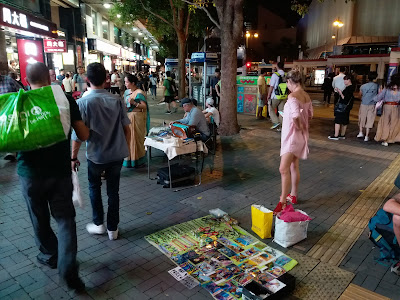At first I'd only heard rumors of young, normally white, expats sitting around public areas selling postcards, hemp-bracelets and other crap. Apparently this is the new trend for recently-emancipated youth: Now too lazy to do actual work in order to fund their adventures, gap-year neophytes are now masquerading as nomadic artisans in Asian cities. I was skeptical at first, but it wasn't long before I came across these vagrants stationed around the Star Ferry Terminal and other tourist hubs, quietly purveying their goods with signage saying romantic BS like "Help me fund my travel dream" in both English and Chinese.
There are some folks who, for one reason or another, end up stuck in a place and have to find a way to survive by becoming dancing robots and whatnot. But "Beg-packers" are mostly privileged white kids who've made a choice to leave the U.S. and Europe with the expectation that people would enable their journeys of "self-discovery." This budget-Eat-Pray-Love silliness is something my fellow millennials and I (unwittingly) contributed to and Generation Z has continued in even more self-indulgent ways. It wouldn't be so bad if the handicrafts involved actual skill, but anyone foolish enough to by their rubbish is only hurting the local professionals who make higher-quality, authentic rubbish.
White people, hear me out: Don't do this. There are plenty of legitimate immigrants and refugees in HK that can get away with this kind of thing because their products have actual cultural significance and they demonstrate actual financial need. But most of you dingbats went to college on your parents' dime and have nothing meaningful to contribute other than helping heal the rampant inequality our demographic has thrust upon the world for the past few centuries. And guess what? You aren't doing that loitering around TST.
 |
| Seems legit |
Perhaps I'm being too cynical. After all, somebody must be buying this stuff or else these people wouldn't be hanging about about. It's quite possible the locals find the idea of giving money to gwei lo amusing. And its not like what these kids are doing is much different from what I did ten years ago, right. Many American and European Caucasians have had this kind of "go East" mentality, almost as if we have a homing instinct for this part of the world and Hong Kong is a hub for our holy pilgrimages to Phuket or KL.
But by-golly, there is the right way to do these things! Either bust your trust-fund or do what I did and (barely) teach English.










